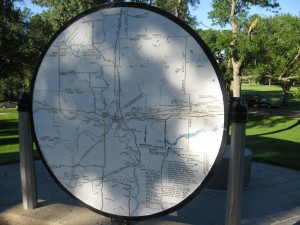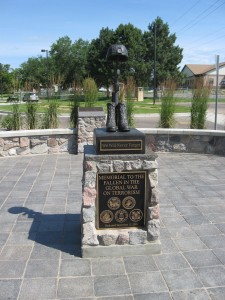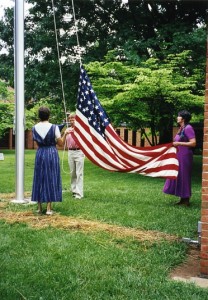“History: 1) an account of what has happened; narrative; story; tale.”
Websters New Universal Unabridged Dictionary, 1979 edition
July 8, about 6 p.m., I arrived at Bismarck ND, where I was to attend a French in America conference. My father was 100% French-Canadian, and I’d just completed a 500 page book on his family’s history, so the conference was a great reason for a trip (and an excellent experience, by the way.)
I was tired, but before I checked into my hotel I wanted to find the site where General Henry Hastings Sibley and troops had reached the Missouri River in the summer of 1863. A long-ago relative, Private Samuel Collette, had been one of the 2800 troops under Sibley’s command. I found the site (General Sibley Campground 3 or 4 miles south of downtown Bismarck at the south end of Washington Street). The next day I was at the ND Capitol grounds, and saw a large pie-shaped monument on the grounds. It turned out to be a map of the last part of the Sibley campaign. The Sibley venture had been, apparently, a very important event in the history of North Dakota, which was to become a state 26 years later. His unit had been in what is now Bismarck July 29-August 1, 1863.

Map of the last portion of the Gen. Henry Hastings Sibley Campaign in 1863
There were some likely facts leading to my interest: I had Samuel Collette’s military records from 1862-63; I now had seen the end-point of the campaign he’d been part of, and knew the many stops in between Minnesota and the Missouri River.
Beyond this, everything was story: the varied interpretations of why Sibley went west, and their meaning etc. etc. Such it is with history: as the above definition suggests, history is simply a collection of stories, perhaps illuminating, perhaps confusing or deliberately distorting.
The family history I had written, which was many years in the making, is many things. But a primary celebration of the history was the recording of stories, particularly of my common folk ancestors: a collective story which included their own recollections, or second or third hand recollections, or documents or written records. I was lucky in that I had a cadre of past and present family members who seemed to have an interest in recording people and events, including through photographs. But my reality is similar to most common families: people lacked literacy, or the time, or the interest, to record things that later generations might find interesting or significant. And every family has pieces of their tale that they’d rather not tell – the hidden and untold story is part of every narrative, without exception. So, for me, the task became assembling a puzzle from assorted scraps of evidence. A very significant portion of those 500 pages were stories recorded by various people over many years. I didn’t call these “facts”; rather they were “stories”. I acknowledged the missing pieces in the book….
On the final afternoon of the conference, I “skipped school” for a couple of hours, just to drive around Bismarck, a city I had last visited 25 years earlier.
Driving down the Main Street of the town, towards the Missouri River bridge, I saw a most unusual sign:

My curiosity was peaked, and I set out to find this Memorial. There was a monument (below) and on two plaques at this Memorial were two very carefully written narratives defining the composers view of the “Global War on Terrorism”. The words on the plaques are reprinted below, and speak for themselves. The Memorial was dedicated September 11, 2009.

Global War on Terrorism Memorial
Were these indelible words representations of “facts”, or were they, simply, some unnamed person’s “story” – a carefully written attempt to fashion a heroic one-sided narrative of a troubling and divisive time in United States history? This “War on a Word” (Terrorism) almost ruined us economically, and severely tarnished our reputation as an ethical society through things like sanctioned use of torture. We lost standing as a part of the world community; and reputation lost is difficult to regain.
Did the permanent recording of heroic victorious words in bronze, in a public space, with a sign showing the way to them, elevate them from “story” into “fact”, more significant than other stories? Or were they, rather, simply an attempt to diminish or eliminate other stories, perhaps even more factual, from the community consciousness?
Earlier, in driving around Bismarck, on individual lawns I saw Peace signs on a couple of lawns. I wonder what their opinion of that Terrorism Memorial might be.

Peace sign in Bismarck ND July 9, 2010
Let the conversation continue.
*****
The Story as told by the plaques at the Global War on Terrorism Memorial:
#1
THE GLOBAL WAR ON TERRORISM
Operation Enduring Freedom
Operation Enduring Freedom began October 7, 2001, in Afghanistan following al-Qaeda’s attack on the United State on September 11, 2001, and has also included operations in the Philippines, Horn of Africa, Trans Sahara, and Kyrgyzstan. In October, 2006, NATO forces, led by the United States and United Kingdom, assumed command of Coalition forces. Afghani Presidential elections were held in October, 2004, and parliamentary elections followed in October, 2005. The enemy continues to resist the elected government of Afghanistan and Coalition efforts to secure freedom and democracy for Afghan citizens.
Operation Iraqi Freedom
Operation Iraqi Freedom began on March 20, 2003, with the liberation of Iraq. Coalition forces from 40 nations participated in military action in support of Operation Iraqi Freedom. By mid-April, 2003, Coalition forces began restoring civil services, despite violence aimed at the new Iraqi government and Coalition forces. In 2006 the first democratic elections were held. On June 29, 2009, United States forces withdrew from Baghdad and other cities across Iraq.
“We seek peace, knowing that peace is the climate of freedom” Dwight Eisenhower
#2
Memorial to the Fallen
in the Global War on Terrorism
This Memorial is dedicated to the members of the United States military and Department of Defense civilians who lost their lives in the Global War on Terrorism. It is a place where families, friends and fellow citizens can reflect on the lives of the Fallen and remember their service to our country. It was funded through the generosity of businesses, organizations and individuals throughout North Dakota and across the United States. The memorial is a joint venture between the City of Bismarck and the North Dakota National Guard.
The Battlefield Cross
The Battlefield Cross has been used as a visible reminder of a deceased comrade since the Civil War. The helmet and identification tags signify the Fallen. The inverted weapon with bayonet signals a time for prayer, a break in the action to pay tribute to the Fallen. The combat boots represent the final march of the last battle.
“We will always remember. We will always be proud. We will always be prepared, so we we will always be free.” President Ronald Reagan






